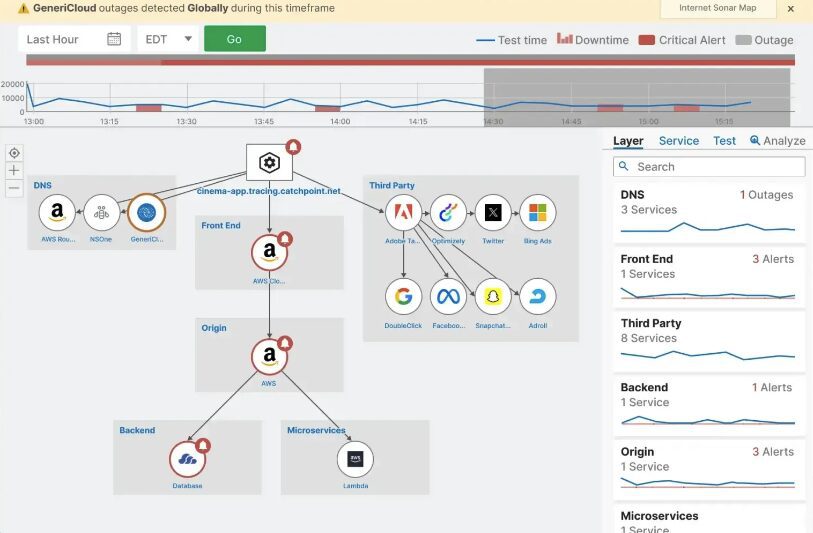Catchpoint IPM
In most cases, the internet functions remarkably effectively, but what happens if it doesn’t? Since our business depends on flawless access to our applications and services, we demand it at all times. But frequently enough, this anticipation and actuality diverge.
The internet both the public and private IP networks is not a miraculously durable and unfailing network; rather, it is intricate, extremely brittle, dynamic, and prone to outages and service interruptions. Slowdowns, lost data, and operational difficulties are potential outcomes for the Site Reliability Engineers (SREs) who work tirelessly to keep our digital world operational and reachable.
Announcing Google Cloud Marketplace’s Catchpoint IPM
Taking note of these difficulties, Google Cloud is happy to inform you Catchpoint’s line of Internet Performance Monitoring (IPM) products, which are intended to support maintaining the dependability and performance of your digital environment, can now be found on the Google Cloud Marketplace. Through this cooperation, the Google Cloud community can easily use the powerful capabilities of Catchpoint IPM, which offers proactive monitoring of your whole Internet stack, including all of your Google Cloud services.
Take advantage of IPM for unmatched worldwide visibility
It is probable that your applications are distributed regionally, cloud-based, and focused on APIs and services. These days, IPM is essential if you want to have the necessary visibility into all the aspects of the Internet that affect your company, including your workers, networks, websites, apps, and customers.
Gaining insight into everything that may affect an application is essential. This includes user Wi-Fi connectivity, key internet services and protocols like DNS and BGP, as well as your own IP infrastructure, including point-to-point connections, SD-WAN, and SASE. International companies must comprehend the real-world experiences of their clients and staff members, no matter where they may be, and how ISPs, routing, and other factors affect them. What IPM offers is this visibility.
Catchpoint IPM tracks the whole application-user journey, in contrast to traditional Application Performance Management (APM) solutions that focus on the internal application stack. This covers all service delivery channels inside the Google Cloud infrastructure, including computation, API management, data analytics, cloud storage, machine learning, and networking products. It also includes BGP, DNS, CDNs, and ISPs.
With almost 3,000 vantage points across the globe, the largest independent observability network in the world powers Google’s award-winning technology, which lets users monitor from the critical locations for network experts to identify and address problems before they affect the company.
IPM strategies to attain online resilience
By utilizing Catchpoint’s IPM platform available on the Google Cloud Marketplace, you may enhance your monitoring capabilities with an array of potent tools. This is a little peek at what to expect.
Google Cloud Test Suite: Start Google Cloud Monitoring tests with a few clicks
With the help of Google Cloud’s and Catchpoint’s best practices for quick problem identification and resolution, IT teams can quickly create numerous tests for Google Cloud services thanks to the Test Suite for Google Cloud. It is especially user-friendly for beginners because of its design, which minimizes complexity and time investment for efficient Google Cloud service monitoring.
Pre-configured test templates for important Google Cloud services like BigQuery, Spanner, Cloud Storage, and Compute Engine are included in the Test Suite. Because these templates are so easily adaptable, customers can quickly modify the tests to meet their unique needs. This is especially helpful for enterprises that need to monitor and deploy their cloud services quickly.
The Internet Stack Map is revolutionary in guaranteeing the efficiency of your most important apps

With Internet Stack Map, you can see your digital service’s and its dependent services’ current state in real time. For any or all of your important apps or services, you can set up as many as you’d like. Using artificial intelligence (AI), Internet Stack Map will automatically identify all of the external components and dependencies required for the operation of each one of your websites and applications.
Looking across the Internet through backbone connections and core protocols, down to the origin server and its supporting infrastructure, along with any third-party dependencies, external APIs, and other services across the Internet, you can quickly assess the health of your application or service. It is impossible to achieve this distinct, next-generation picture with any other monitoring or observability provider.
Internet Sonar: Provide a response to the query, “Is it me or something else?”
Point of convergence In order to help you avoid occurrences that could negatively effect your experience or productivity, Internet Sonar intelligently offers clear and reliable internet health information at a glance. Internet Sonar monitors from where it matters by using information from the largest independent active observability network in the world. The outcome is a real-time status report driven by AI that can be viewed through an interactive dashboard widget and map, or it can be accessible by any system using an API.
Collaboration between Catchpoint and Google Cloud front end
To further enhance our performance monitoring offerings, Catchpoint has teamed up with Google Cloud to support their front end infrastructure worldwide. Through this partnership, Google Cloud’s global front end and Catchpoint’s Internet Performance Monitoring (IPM) capabilities are combined to give customers more tools for monitoring online performance globally.
Through this cooperation, users will be able to take advantage of Catchpoint’s experience in identifying and resolving performance issues early on, resulting in optimal uptime and service reliability. In addition, Catchpoint is providing professional assistance and a free trial to help gauge and enhance the performance of services that use Google’s global front end.


